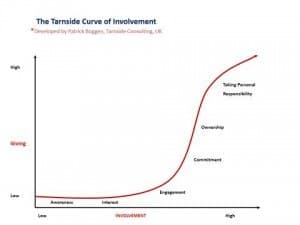If it were easy to do we wouldn’t need you
- Written by
- Karen Osborne
- Added
- January 21, 2016


Major gift fundraising at its best can transform an organisation. When an inspired potential donor says ‘we have to make that happen’; ‘it’s critical that we solve this societal problem’; ‘how can I help?’ incredible philanthropic investments follow. So why do some of us spend so little time getting this right?
One reason is because so many other things are easier to do.
Our first task can be hard. We need big, societal-changing ideas that inspire joyful, generous investments. A donor could love us and have the ability to make an extraordinary gift but we’ve not given her a reason to invest.
Too many of us only have our mission and a laundry list of needs: a lab, a programme, a building, technology, or unrestricted gifts to keep the lights on.
A gifted executive director I knew enjoyed the friendship and support of a loyal and generous board member. The ED counted on this donor for 20 years to cover his back. A budget shortfall: Bob stepped in. A new initiative: Bob made the lead gift. Then one day the ED learns that Bob made two transformational gifts to two other organisations in the community, gifts four and five times the size of the gifts he gave to the ED’s organisation.
The ED was devastated. He went to visit Bob and, after congratulating him, he asked why them and not us. Bob looked perplexed and replied, ‘You never gave me a transformational idea.’
As Simon Sinek tells us, start with ‘why’. Then share the ideas that will help you achieve your vision and propel your work. It takes effort to pull these ideas out of CEOs and mission staff. If it were easy, we wouldn’t need you.
We know major gift fundraising takes time and focus.
Now we have our big ideas and potential donors to inspire. Our boards want the money now and not in the six to 18 months it takes, on average, to close a major six or seven-figure gift. So we cave. We rush it, asking too soon, receiving too little, which is so much easier than standing our ground.
Even when given the time to do our work, too many of us take easy shortcuts. We know, for example, that strategic engagement is essential for major gift success. In fact, the more one is engaged in meaningful and productive work, the larger the philanthropic investment.
Most major gifts require four to seven such strategic steps that engage the donor with the mission, vision and work of the organisation. Yet we shoehorn our donors into the next event we’re having, or think of engagement as visiting and talking at them rather than listening to them. We take no time or too little time thinking through the steps, making sure each one has a measurable goal that results in increased motivation to give the size of gift you seek for the mission priority you need.
Nor do we create meaningful and productive engagement opportunities; activities and experiences that use donors’ time, expertise, talents and wisdom. Instead, we ask them to give us names, make introductions, while selling them giving and naming opportunities as if we were a shopping mall.
Why would we do this? It’s easier.
I proudly serve on a board and volunteer for my church and other organisations I love. The work is gratifying but oh so time consuming. It is much easier to sell tickets to the gala or secure supporters for the ‘walk’ than to help engage HNWI in meaningful ways. Just as it is easier for us to fill our board with people we hope will be good, rather than with people we’ve already engaged in our work, solicited for a meaningful gift and stewarded before inviting them on the board.
We know stewardship (reporting to donors on the impact of past gifts, connecting donors directly to that impact through experiences, visuals, stories and mission-voices) is critical yet we give it short shrift. Thank-you notes are sent and invitations to our thank-you lunch. Inspired, personal stewardship: that’s hard.
Easier is sometimes effective but most times not, or not as, effective as our work could be.

We need to be ambitious for our missions. Focus on the right things. Build the right relationships. Be strategic. Take time to think. Measure. We need to solicit when we have the ‘rights’ right starting with the right purpose or impact, the inspirational outcome the donor is seeking and the organisation needs. A joyful and generous investment will follow.
If it were easy to do it right we wouldn’t need someone as smart, committed, creative, persistent, empathetic and courageous as you.
© 101fundraising 2014


















